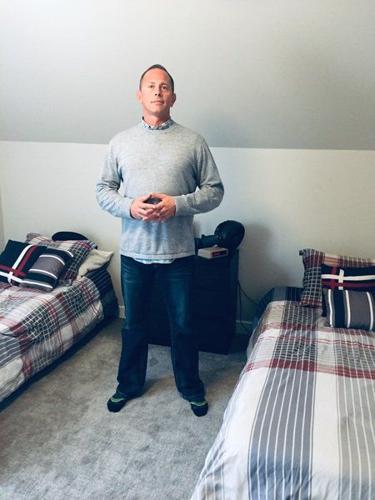GAYLORD — While physicians, addiction treatment counselors, medical technologists, pharmaceutical start-ups, sociologists, and politicians all look for new solutions to the opioid crisis, one decidedly low-tech approach is coming from an unlikely source: the Michigan State Police.
And in small but important ways, it’s working.
“They give us a room with a table and a phone, verify information, and we pretty much take it from there,” said Jason DeBeck, of Boyne City.
DeBeck, 43, is one of the MSP’s lead Angel Program volunteers. The Angel Program is a statewide pre-arrest diversion initiative that trains former users on how to get active users into recovery. It began as a pilot program at the Gaylord post with 10 Angel volunteers in November 2016, and went statewide 13 months later in December 2017.
With a few exceptions, anyone struggling with drug addiction can now walk into a Michigan State Police Post during regular business hours (8 a.m.to 4 p.m. M-F), ask for help, and be connected with an Angel volunteer.
“When I first heard of it I thought, ‘This is a fantastic idea,’” DeBeck said, during an interview at Nathan’s House, the sober living home he runs in Boyne City with his wife, Jennifer.
“It was remarkable to me that our state would do something like that. Typically you think once people get engaged in the abuse cycle the last thing they want to do is go see a cop.”
DeBeck said being a former opioid abuser gives him valuable inside knowledge on both the struggles and joys of recovery. DeBeck has been sober since April 12, 2012, after completing Munson Medical Center’s two-week intensive outpatient with hospitalization program, and attending a 12-step recovery program immediately upon release.
As a trainer of Angel volunteers, Gaylord post’s Community Service Trooper, Corey Hebner, agreed that active users might be hesitant to ask police for help, but said it would not stop the MSP from trying to give it in a meaningful way.
According to the MSP, during the pilot program 37 people were helped into treatment. Since the program went statewide, that number climbed to 96.
Hebner said in his experience users may need to be in treatment as many as six times before they are successful at sobriety. Those most likely to use the Angel Program are people who are seeking treatment for the first time. If someone has been in treatment before, they probably already know who to call for help. In contrast, those seeking treatment for the first time may have been hiding their addiction or have no support system, or both.
Hebner also stressed that the Angel Program is not a way for the disingenuous to avoid consequences.
“It’s not like they can be in a chase with police and its olly olly oxen free,” the trooper said. “But if they show up with the sole purpose of getting into treatment . . . this is just another mechanism for them to get help.”
The exceptions, Hebner said, are people with a felony warrant and/or registered sex offenders.
At the end of November, the Centers for Disease Control and Prevention released new figures showing that in 2017, drug overdoses killed more than 70,000 Americans. Of that number 2,686 of those deaths were of Michigan residents, a 12.6 percent increase over 2016. Nationwide, drug overdoses are now the leading cause of death for adults under 55, the CDC said.
“Opioids are the equal opportunity destroyer,” DeBeck said. “I really haven’t seen one age group or one gender group. I do this because I like helping people. And selfishly, doing it helps me in my recovery as well. To be able to help that person while they are in crisis, to help them during this scary time, is very rewarding.”
Former opioid abusers sober at least two years who are interested in volunteering can find out more by visiting www.michigan.gov/AngelProgram.
According to Trooper David Prichard, the Angel Program volunteer coordinator for northwest lower Michigan, the Traverse City area in particular needs volunteers, and those interested can call him at 231-779-6040.
Chronology of an Angel Intervention
By Mardi Link
Someone seeking treatment for a substance use disorder walks into any one of the state’s thirty Michigan State Police posts Monday through Friday between 8 a.m. and 4 p.m., asking for help.
The sergeant on duty accesses the step-by-step PowerPoint file created by Trooper Corey Hebner and stored on the MSP’s S drive.
A MSP officer verifies the person’s identity, completes a background check, and calls an Angel Program volunteer. If the person asking for help has drugs or drub paraphernalia with them, they must surrender these to police.
The Angel volunteer arrives at the post and meets with the person seeking help in a private interview room.
The Angel volunteer calls the Northern Michigan Regional Entity and either detox or a residential treatment placement is found for the person that same day.
The Angel volunteer drives the person seeking help to the detox or treatment facility. If the person seeking treatment is a woman and the Angel volunteer is a man, the volunteer calls a female volunteer to accompany them to the treatment location. If the volunteer is a woman and the person seeking help is man, a male volunteer is called.
The MSP sends anonymous progress reports to Boston University’s School of Public Health at three, six, and twelve-month intervals as part of a nationwide study on the effectiveness of the Angel Program.





















